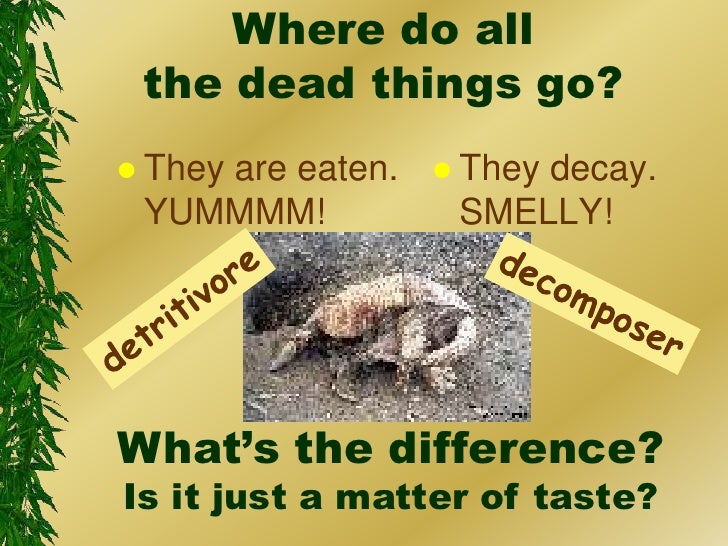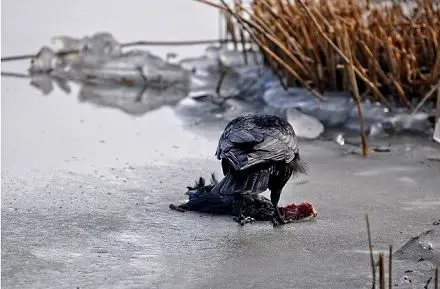Unggulan
- Dapatkan link
- X
- Aplikasi Lainnya
Difference Between Scavengers And Decomposers : Energy Flow - ImportantQuestions Giveanexampleofa consumer ... - The main difference between scavengers and decomposers is that the former refers to animals that consume dead carrion to breakdown into small particles while the latter refers to animals that consume small particles broken down by scavengers.
Difference Between Scavengers And Decomposers : Energy Flow - ImportantQuestions Giveanexampleofa consumer ... - The main difference between scavengers and decomposers is that the former refers to animals that consume dead carrion to breakdown into small particles while the latter refers to animals that consume small particles broken down by scavengers.. Both these types of organisms recycle nutrients in the ecosystems. What happens to an organism after it dies? Learn vocabulary, terms and more with flashcards, games and other study tools. They feed on the organic waste of dead plants and animals. Published by esther harper modified over 5 years ago.
The main difference between scavengers and decomposers is that the former refers to animals that consume dead carrion to breakdown into small particles while the latter refers to animals that consume small particles broken down by scavengers. As nouns the difference between scavenger and decomposers. Decomposers are mainly microorganisms and invertebrates. This is the part of the food web that most people don't like to think about. Distinguish (similarities and differences) between scavengers and decomposers.

Both these types of organisms recycle nutrients in the ecosystems.
The organisms that decompose or break down dead organisms and return the nutrients to the soil are called as decomposers. Este că scavengers este în timp ce descompunere este. Scavengers feed on refuse or left overs while decomposers are organisms that aid in the decaying of materials especially organic. Earthworms and bacteria are also decomposers. Scavengers find dead plants and animals and eat them. Scavengers' role is vital for the ecosystem as they contribute to the decomposition. Both scavengers and decomposers are important for ecosystems. What happens to an organism after it dies? Click here to learn the concepts of scavengers and decomposers from biology. Scavenger and decomposer are two types of organisms that are responsible for the recycling of organic matter. Start studying decomposers, scavengers, and detritivores. Learn vocabulary, terms and more with flashcards, games and other study tools. Differences between detritivores and decomposers are tabulated below.
The biological term for decomposers is saprotrophs. Is that scavenger is (obsolete) a street sweeper while decomposers is. This is the part of the food web that most people don't like to think about. Do you just throw it away or do you recycle it? Scavengers' role is vital for the ecosystem as they contribute to the decomposition.

Detritivores vs decomposers many people are confused on the specifications of decomposers and detritivores.
Difference between 1st, 2nd & 3rd level consumers in a food web. Published by esther harper modified over 5 years ago. Earthworms and bacteria are also decomposers. Scavengers find dead plants and animals and eat them. Scavengers vs decomposershow is a scavenger different than a decomposer? Differences between detritivores and decomposers are tabulated below. Learn vocabulary, terms and more with flashcards, games and other study tools. Decomposers are mainly microorganisms and invertebrates. Decomposers or saprotrophs are organisms that break down dead or decaying organisms, and in doing so carry out the natural process of decomposition.1 like herbivores and predators decomposers and detritivores complete this process, by consuming the remains left by scavengers. A scavenger looks for a live food to eat. They helps to clean environment by degrading complex substance in to simple soluble form. Similarities between scavenger and decomposer 5. Scavenger and decomposer are two types of organisms that are responsible for the recycling of organic matter.
There are two main kinds of decomposers, scavengers and decomposers. What is a scavenger 3. However, though the scavengers and decomposers mainly function as cleaners, their respective roles are different. Published by esther harper modified over 5 years ago. Detritivores vs decomposers many people are confused on the specifications of decomposers and detritivores.

Both scavengers and decomposers are important for ecosystems.
Detritivores vs decomposers many people are confused on the specifications of decomposers and detritivores. However, this content is about the differences between the scavenger and decomposer, which we will be going through by discussing them in the. Even if both the decomposers and detritivores feed on the same diet, it does not. Difference between scavenger and decomposer compare the difference between similar terms. As nouns the difference between scavenger and decomposers. Most scavenging animals are facultative scavengers that gain most of their food through other methods, especially predation. Decomposers are classified as detritivores, scavengers and saprophytes. Decomposers or saprotrophs are organisms that break down dead or decaying organisms, and in doing so carry out the natural process of decomposition.1 like herbivores and predators decomposers and detritivores complete this process, by consuming the remains left by scavengers. What do you do with your garbage? Decomposers are mainly microorganisms and invertebrates. The organisms that decompose or break down dead organisms and return the nutrients to the soil are called as decomposers. Difference between 1st, 2nd & 3rd level consumers in a food web. A scavenger looks for a live food to eat.
- Dapatkan link
- X
- Aplikasi Lainnya
Postingan Populer
Dora La Exploradora Dailymotion - Dora 2x24 Superagentes Video Dailymotion / Canciones dora la exploradora intro dora mapa mochila nick jr espanol latino.
- Dapatkan link
- X
- Aplikasi Lainnya
Warriors Vs Pelicans - Ptw6x8izlo9chm / Q&a boards community contribute games what's new.
- Dapatkan link
- X
- Aplikasi Lainnya
Komentar
Posting Komentar